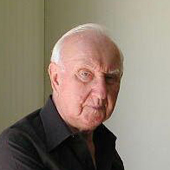
Lees, Benjamin
Benjamin Lees (January 8, 1924 – May 31, 2010) was an American composer of classical music.
After serving in the United States military, Lees studied composition under Halsey Stevens, as well as with Kalitz and Ingolf Dahl, at the University of Southern California in Los Angeles, California. Composer George Antheil, impressed by Lees’ compositions, offered further tutelage; this period lasted four years, at the end of which Lees won a Fromm Foundation Award. Of Antheil, Lees declared: “He changed my life.”[4]
The receipt of a Guggenheim Fellowship in 1954 allowed him to live in Europe, realizing his goal of developing his individual style away from current fashions in the American art music scene and resulting in a number of mature and impressive works.[5] Returning to the United States in 1961, he divided his time between composition and teaching at several institutions. These included the Peabody Conservatory (1962–64, 1966–68), Queens College (1964–66), the Manhattan School of Music (1972–74), and the Juilliard School (1976–77).[5]
Lees rejected atonalism and Americana in favor of classical structures. Niall O’Loughlin writes in The New Grove Dictionary of Music and Musicians, “From an early interest in the bittersweet melodic style of Prokofiev and the bizarre and surrealist aspects of Bartók‘s music, he progressed naturally under the unconventional guidance of Antheil.”[5] Lees’ music is rhythmically active, with frequently changing accents and meter even in his early works, and is known for its semitonal inflections in melody and harmony.[5]
In 1954, the NBC Symphony Orchestra performed his Profiles for Orchestra on a national radio broadcast.[6] In 1970, Medea in Corinth, his one-act musical drama, was given its premiere at the Purcell Room, Queen Elizabeth Hall, London,[7] and was subsequently broadcast by CBS Television in 1974.[8] Other, notable works include Symphony No. 4: Memorial Candles, commissioned by the Dallas Symphony Orchestra in 1985 to commemorate the Holocaust, and Symphony No. 5: Kalmar Nyckel, written in 1986 to honor the founding of Wilmington, Delaware.[6] (Kalmar Nyckel was the name of the ship that first carried the original settlers from Sweden to what would become Wilmington.)[6] In 1994 Echoes of Normandy was commissioned by the Dallas Symphony Orchestra to commemorate the 50th anniversary of the D-Day landings.[7] His 1998 Piano Trio no. 2, “Silent Voices” was written in Palm Springs.[9]
Lees received a Grammy nomination for Kalmar Nyckel in 2003, following release of a recording by the German orchestra Staatsphilharmonie Rheinland-Pfalz under Stephen Gunzenhauser.[6] He lost to Dominick Argento.[6]
Lees married Luba Leatrice Banks in 1948. They had one daughter.[1] Lees donated his archive of manuscripts, sketches, scores, letters, photographs, articles, recordings and posters to Yale University. Shortly before his death at age 86, he emailed that he was, “busy as fleas in a circus”.[1] He died in Glen Cove, New York.
Awards and honors
- 1953: Fromm Foundation Award
- 1954: Guggenheim Fellowship
- 1955: Copley Medal
- 1956: Fulbright Fellowship
- 1958: UNESCO Award, Sir Arnold Bax Society Medal
- 1966: Guggenheim Fellowship
- 1985: Lancaster Symphony Orchestra‘s Composer’s Award
- 2003: Grammy Nomination[6]
- National Patron of Delta Omicron, an international professional music fraternity.[10]
